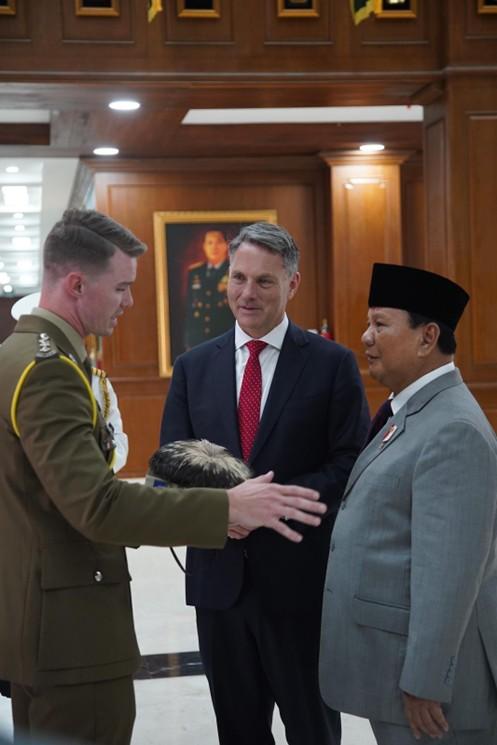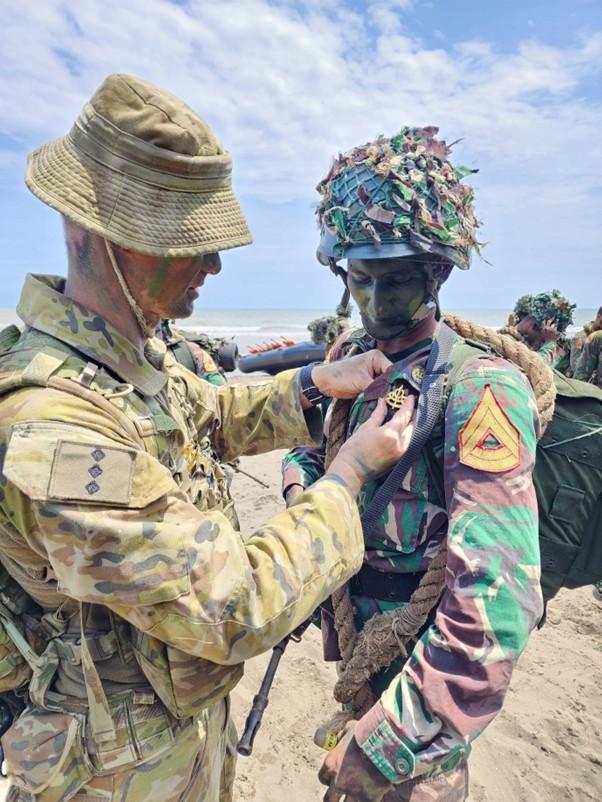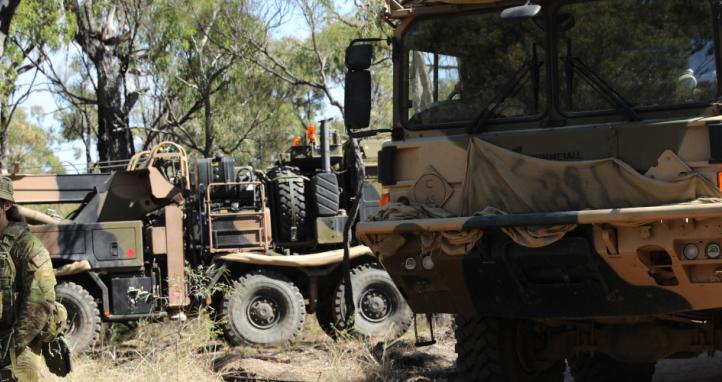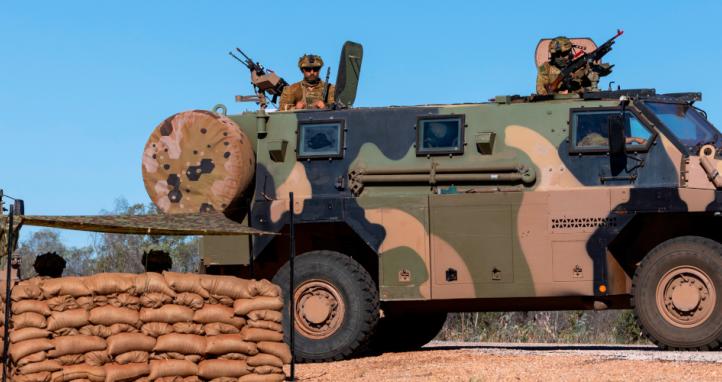Introduction
The historic signing of the Defence Cooperation Agreement (DCA) by the Australian and Indonesian governments occurred in Magelang, Central Java, Indonesia, on 29 August 2024. This milestone signifies an unprecedented strengthening of the military relationship between Australia and Indonesia, which comes at a crucial juncture. With modern geopolitical threats jeopardising the stability of our region and the rules-based framework that supports international law, it has become more essential than ever to enhance practical cooperation and interoperability between our defence forces.
Indonesia’s Akademi Militer, commonly referred to as Akmil, was chosen as the venue for signing the DCA due to its importance to President Prabowo Subianto, who began his military career there as a cadet in 1970. Akmil serves as the equivalent of the Royal Military College – Duntroon (RMC-D) for the Tentara Nasional Indonesia-Angkatan Darat (TNI-AD), or Indonesian Army. While not as globally recognised as institutions like the Royal Military Academy – Sandhurst or the United States Military Academy West Point, Akmil holds significant regional relevance for Australia. Our involvement with Akmil began in 2019 when we launched the exchange instructor program, and I have been assigned to Akmil starting in 2024 for two years.
With
The Australian exchange instructor role places me at the heart of Indonesia and Australia’s ongoing commitment to enhanced regional security. In this role, I spearhead the people-to-people links that establish key groundwork for the continued strengthening of our bilateral relationship. This exchange program, initiated through Army-to-Army Staff Talks, involves an Indonesian instructor being posted to RMC-D and an Australian instructor being assigned to Akmil. What makes this arrangement unique in Akmil’s case is that there are no other foreign instructors posted there. The Australian instructor is the only non-Indonesian staff member at the Academy. The level of representation and influence achieved by the Australian instructor at Akmil is aptly illustrated by the striking contrast of the single set of AMCU-patterned camouflage and plumed slouch hat against a sea of exclusively deep green Indonesian jungle uniforms.
For all Akmil cadets and most staff, their interaction with the Australian Instructor is likely the first time they have engaged with a foreign military officer. The Australian Akmil Instructor directly influences how Indonesia’s next generation of military leaders perceives Australia as a regional partner choice.
The position of Australian Instructor at Akmil is crucial for fulfilling the goals set out in the Australian National Defence Strategy (NDS). It specifically aids the ADF in carrying out the last two of its five designated tasks: partnering in the Indo-Pacific's collective security and maintaining the global rules-based order. According to the NDS, National Defence is described as ‘a coordinated, whole-of-government and whole-of-nation effort that utilises all facets of national power to protect Australia and promote our interests.’
Preserving a favourable regional strategic balance necessitates leveraging all aspects of national power, including economic, military, and diplomatic resources. The role of the Australian Instructor at Akmil lies at the crossroads of military and diplomacy, promoting Australia’s interests by serving as a visible and active representative of its commitment to Indonesia. Each day, the Australian Instructor at Akmil strengthens defence ties and directly improves military cooperation between the two nations.
By being uniquely positioned at the officer ab-initio training level, the Australian instructor is able to ensure, at the earliest opportunity, that junior Indonesian Army officers develop a mutual understanding of how the Australian and Indonesian Armies work together to support one another. This, in turn, has a significant effect on enhancing future interoperability and preparedness for both Australia and Indonesia to collaborate in defending a prosperous and secure Indo-Pacific. As such, the effects achieved by the Australian instructor position at Akmil directly and tangibly contribute to the Australian Government's broader objectives and overall regional security strategy.
By
My journey to Akmil began as a junior officer with an interest in foreign languages and a desire to conduct long-term language training at the Defence Force School of Languages (DFSL). As a first-year captain, I was approached by my CO and career advisor to gauge my interest in competing for a newly established selective overseas posting as an instructor at Akmil in Indonesia. At this point, like many others, I had never even heard of Akmil before. I instantly knew that this would be the opportunity of a lifetime, so I opted into the process. After being selected for the posting by a board, I received a posting order to attend a 12-month Indonesian language course at DFSL in preparation for the role.
My role at Akmil facilitates the exchange of knowledge and experiences, establishing a foundation for long-term partnerships. I am able to mentor future Indonesian Army leaders and cultivate a shared understanding of our common strategic goals and operational art. The emphasis of my position on enhancing interoperability prepares both our armies for future bi-lateral operations and the shared achievement of our common strategic regional objectives.
An example of this was demonstrated when I joined the cadets for their annual Exercise Widya Yudha. This is a combined arms exercise where cadets are assigned to platoons in the field according to their individual corps allocation. It sees the cadets operate as a combined arms battle group against a common enemy within a realistic and live-developing tactical scenario.
For the 2024 iteration of Exercise Widya Yudha, I was assigned as an instructor to Akmil’s armoured cavalry troop, which was supplemented with armoured fighting vehicles (AFVs) and external instructors from Indonesia’s School of Armour (Pusdikkav). This was an excellent opportunity for me to teach lessons specific to my trade and share my experiences as an Armoured Corps officer with not only the country’s future Armoured Corps troop leaders but also with the other instructors present.
Throughout the week-long exercise, I was able to demonstrate to them the methods that Australia utilises to conduct combined-arms warfare and AFV manoeuvre. It also presented the opportunity to discuss how our armoured forces would likely operate together on the battlefield – a scenario which I would subsequently watch play out in real time during the bi-lateral Exercise Keris Woomera later that year. This involved Australian M1A1 Abrams operating alongside Indonesian Leopard 2 tanks after a successful joint amphibious landing near Banyuwangi, East Java.
The highlight of my posting so far has been the opportunity to participate in all of Akmil’s major field exercises held each year, the most memorable of which was Exercise Pramuka Yudha. This exercise can be closely compared to RMC-D’s Exercise Shaggy Ridge. At its core, this is a jungle survival exercise where cadets are assessed on their character and attributes as they undertake a series of physically and mentally demanding challenges. The cadets are required to climb and occupy company positions atop mountains, forage for food sources found only in the jungle, skin and eat giant pythons, conduct multi-day extended pack marches, engage in open-ocean military rafting, and participate in a final culminating exercise involving an amphibious landing and assault on an enemy-held coastline. Being part of this exercise not only taught me a great deal about how Akmil is preparing Indonesia’s potential Army Officers for the future, but it also provided me with many unique experiences and memories.
Although it has been an overwhelmingly positive experience, temporarily relocating my life to rural Indonesia for a two-year period has not come without its challenges. The Academy is situated in the small rural town of Magelang in Central Java. Being a predominantly agrarian area, the Australian cities that come closest to my mind for comparison are Wagga Wagga or perhaps Ballarat. With only 129,000 residents and being entirely surrounded by both picturesque (and active) volcanoes, as well as seemingly endless farmland and rice paddies, it is a far cry from most Australians' highly touristic experiences in Bali, like Kuta Beach and Ubud. In fact, not only am I the only foreign instructor posted to Akmil, but I am also ostensibly the only foreigner living in the city of Magelang. Aside from the English classes I assist with, all my daily interactions – from speaking with my colleagues to even buying food and goods – are now entirely conducted in Indonesian. My first English conversation of the day is often when I call my partner back in Australia after finishing work in the evening.
An initial challenge that shocked me early in my first week in-country was the heavy use of local languages instead of the country’s national language, Bahasa Indonesia. Despite graduating from DFSL’s Bahasa Indonesia course and feeling prepared to fully integrate into an Indonesian military unit, it surprised me that I still could not understand much of the conversations among the other staff members. This was until I realised that they were not even speaking Bahasa Indonesia, but instead Javanese, a language native to Central and Eastern Java. The use of local dialects was something touched upon at DFSL; however, it was not until I was in-country that I fully understood the extent to which they are used.
Most of the TNI-AD staff assigned to Akmil tend to come from the area around Magelang, where Javanese is the first language they speak while growing up, often only learning Bahasa Indonesia in a school environment, much like me. Upon learning this and realising that other staff members who had been posted from other provinces within Indonesia also couldn’t fully understand these conversations, I felt less like a foreigner and more like a staff member from another region. Although I experienced some inevitable initial communication challenges in the early months, this environment has been fantastic for rapidly improving my language skills. Through sheer necessity and some assistance from my Javanese colleagues, I have now built an increasing repertoire of Javanese words and phrases.
For those heading to international postings where daily use of a foreign language is required, be prepared to make mistakes – frequently. The key is to push past any fear of embarrassment, have a laugh at your own expense, and carry on with a smile while embracing every opportunity to immerse yourself. Language acquisition occurs fastest when you step outside your comfort zone and fully engage with the local culture. Your efforts will be noticed and appreciated.
Despite being posted to Akmil and falling within the Cadet Regiment’s chain of command as both an instructor and a Company 2IC in the Second Year Cadet Battalion, I am still officially assigned to Indonesia under the command of the Australian Defence Staff – Jakarta. This means that I report to the Australian Army Attaché and the Head of the Australian Defence Staff at the Embassy in Jakarta, albeit as the most geographically isolated member of Australia’s military presence in Indonesia. I am often fortunate to travel across Indonesia to attend embassy events and military exercises along with the rest of the ADF team at post. These activities are some of the most enjoyable and eye-opening, reinforcing just how much impact a focused and dedicated team can have in increasing cooperation and interoperability between two nations.
Through
Overall, the cadets for whom I am responsible, not only from my company or battalion but from across the entire Academy, are motivated and eager to learn. The classes I teach or am involved in can vary widely, ranging from section and platoon-level minor tactics and safety supervising at the shooting range to teaching English language classes. Despite the broad variety of activities, one thing that never changes is that the cadets are always eager to learn and often ask a wide range of questions about life in Australia, RMC-D, and the Australian Army. Similarly, the conversations I frequently share with my fellow battalion staff are always entertaining and friendly, whether they are asking questions about Australia, or I am asking about the complex Indonesian culture. It is always a genuine interaction filled with its fair share of humour.
While posted to Akmil, I have unique access not only to the cadets and their staff but also to key decision-makers within both the academy and the wider TNI. Akmil is a very top-heavy environment, with ten brigadiers making up the senior staff under a two-star major general who serves as the Governor of the Academy (referred to as the ‘Commandant’ in Australian terminology). I am often called into meetings or involved in conversations with high-ranking officials, conducting these discussions entirely in Indonesian. The senior staff at Akmil are consistently just as friendly, if not even more so, than everyone else I have met during my time here. They often ask how my experience is going and always do their best to ensure I am comfortable and have everything I need to perform my role.
My high-level interactions have not been limited to Akmil staff. I have also been fortunate to meet Kasad (Indonesia’s Chief of Army) General Maruli Simanjuntak, the entire new Government Ministerial Staff of Indonesia during their Cabinet Retreat at Akmil, and I was even invited by the Australian Defence Minister, Richard Marles, to directly meet Indonesia’s President Prabowo Subianto at the DCA signing. Prabowo showed a keen interest in the history behind the plumes on my slouch hat. These have been some of the most memorable interactions of my posting so far and highlight the geopolitical importance of having the Australian Army represented at such an influential institution.
When speaking with other senior members from the Embassy who have spent much more time in-country than I have, along with multiple postings to Indonesia under their belts, one key theme resonates with them as it does with me: the unwavering kindness and generosity of the Indonesian people. Despite being far from home and family, I have felt extremely welcome here right from my very first day in Indonesia, not only by all my TNI colleagues at Akmil but also by the local community in Magelang. While the culture differs in almost every aspect from that back home, my education at DFSL and my willingness to remain open, interested, and committed to learning about the Indonesian way of life have provided me with nothing but positive experiences.
My involvement at Akmil has been directly aligned with the Chief of Army's Pillars, showcasing Australia’s commitment to regional security through active engagement and defence diplomacy. Maintaining high ethical and professional standards is essential in a cross-cultural setting like this. I prioritise respecting local customs and norms while upholding the values of the Australian Army. By fostering mutual understanding and respect, I contribute to build a positive image of the Australian Defence Force, which I believe will strengthen our future collaboration within the region.
Conclusion
The experience I have gained during my tenure as the Australian Instructor at Akmil will certainly prove critical in the future as the global strategic environment becomes more contested. Upon my return to Australia, I will be better equipped to contribute to Defence’s understanding of the region and how to best engage with our partners. My role has strengthened our position as a trusted partner within the region, and by sharing my expertise and learning from local practices, I am contributing to improving the operational readiness of both our forces.
My posting to Akmil has been both a challenging and rewarding experience. While it demands significant personal and professional commitment, the opportunity to fully immerse oneself in a foreign military environment and culture is invaluable. It requires adaptability, patience, and an openness to learning; those who are interested in languages and possess high levels of cultural sensitivity and emotional intelligence will find this posting to be a unique and eye-opening opportunity. It has been the greatest honour of my career to directly contribute to deepening the relationship between our two nations and to continue building the people-to-people links between our armies.

CAPT Damon Radford meets then Indonesian Defence Minister Prabowo Subianto and Australian Defence Minister Richard Marles at the Defence Cooperation Agreement Signing at the Akademi Militer, Indonesia on 29 August 2024.

CAPT Damon Radford celebrates with Indonesian Akademi Militer Cadets from his Company after completing the culminating activity of Exercise Pramuka Yudha on 01 March 2024.










A vital link between two countries with a logical agenda. Well done Damon congratulations and thank you for your fine work